Choosing the right battery for your car may seem like a simple task, but understanding what aspects to consider to make a good decision is crucial. With so many options available in the market, it’s easy to feel overwhelmed. However, making a good choice can make a difference in your vehicle’s performance and durability. Throughout this guide, we’ll break down the essential factors you should consider to ensure your car has the perfect battery.
Imagine being on a cold winter morning, turning the ignition key and hearing that frustrating click indicating the battery has failed. Avoiding these situations starts with selecting the right battery. From size and type to cold cranking amps (CCA), every aspect plays a vital role.
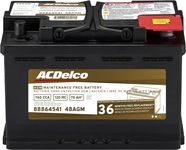
ACDelco Gold 48AGM 36 Month Warranty AGM BCI Group 48 Battery , Black
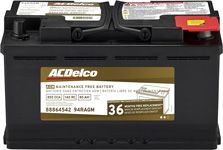
High density negative paste, improves performance and increases battery life
Publication contents:
What factors should I consider when choosing a battery for my car?
When considering a car battery, there are several important factors you should keep in mind to make the best decision. It’s crucial to check the size and type of the battery.
Car batteries come in different sizes and configurations, so choosing one that fits your vehicle perfectly is essential. Consult the owner’s manual or ask an expert to ensure you select the correct battery for your car.
Another key aspect is Cold Cranking Amps (CCA). This measure indicates the battery’s ability to start the engine in extreme cold conditions. If you live in an area with low temperatures, a battery with high CCA is indispensable.
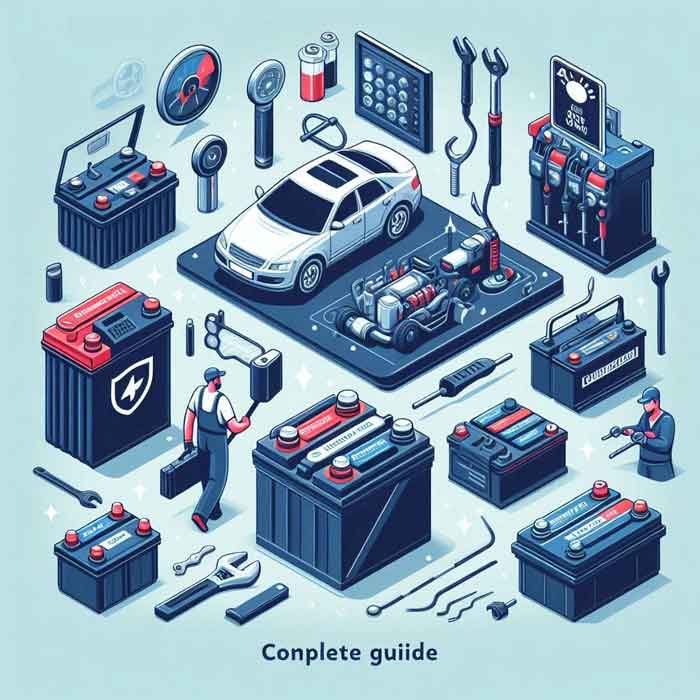
Additionally, Reserve Capacity (RC) is another important factor. RC indicates how long the battery can supply power if the vehicle’s charging system fails. A higher reserve capacity means you’ll have more time to reach a safe place in case of an emergency.
The battery’s brand and warranty are also factors to consider. Opting for recognized and reputable brands can ensure greater durability and performance. Make sure to choose a battery with an adequate warranty that provides peace of mind in case of unexpected failures.
Consider the battery technology. Lead-acid batteries are the most common, but lithium-ion batteries are gaining popularity due to their higher efficiency and lighter weight. Evaluate your needs and choose the technology that best suits your situation.
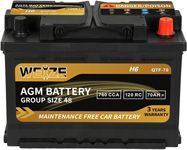
Weize Platinum AGM Battery BCI Group 48-12v 70ah H6 Size 48 Automotive Battery, 120RC, 760CCA, 36 Months Warranty
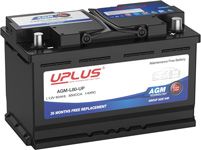
UPLUS BCI Group 94R Car Battery, AGM-L80-UP Maintenance Free 12V 80Ah Premium AGM Batteries H7 L4 Automotive Battery, 850CCA, 140RC
What characteristics define a good car battery?
If you’re looking for a battery that meets all your expectations, here’s a list of features to consider:
- Internal Plate Technology: Batteries with advanced technology in their internal plates typically offer better performance and durability. Look for batteries that use special alloys to enhance efficiency.
- Overcharge Protection: A good car battery should include mechanisms for protection against overcharging. This prevents damage to both the battery and the vehicle’s electrical system.
- Resilient Coating: The battery’s coating should be robust and resistant to impacts. This ensures the battery can withstand tough conditions without damage.
- Corrosion Resistance: The battery terminals and connections should be made from materials resistant to corrosion. This extends the battery’s lifespan and ensures optimal electrical contact.
- Weight and Ease of Handling: Opting for a battery that isn’t excessively heavy makes installation and handling easier. An ergonomic design can be a plus.
- Stable Voltage: An important feature is that the battery maintains a constant and stable voltage during use. This guarantees consistent and reliable performance.
- Fast Recharge Capacity: Look for batteries that offer quick recharge times. This is particularly useful if you use your vehicle frequently and don’t have time for long recharges.
- Status Indicators: Some batteries come with built-in status indicators that display the charge level and health of the battery. This feature is useful for regular monitoring and preventive maintenance.
- Environmental Compatibility: Consider batteries that are eco-friendly and comply with environmental regulations. This is not only better for the planet but may also align with local battery recycling and disposal policies.
How do I know if my car battery needs to be replaced?
Car batteries don’t last forever, and it’s important to identify the signs indicating it’s time for a replacement. Here’s how you can tell:
- Difficulty Starting: If your vehicle takes longer than usual to start, it could be a sign that the battery is losing its capacity. This is a clear indication that the car battery may be failing.
- Dim Lights: The car’s lights, both interior and exterior, may become dimmer as the battery nears depletion. Watch for dashboard lights or headlights that don’t shine as brightly as usual.
- Defective Electrical System: If you notice that the vehicle’s electrical systems, such as the radio or windshield wipers, aren’t functioning properly, it could be due to a weak battery.
- Sulfur Smell: A smell of sulfur or rotten eggs may indicate the battery has a leak. This is a serious issue that requires immediate attention.
- Swollen Battery Case: Vehicle batteries can swell due to exposure to heat. If you notice the battery case is distorted, it likely needs to be replaced.
- Old and Worn Out: Car batteries have an average lifespan of 3 to 5 years. If yours is older than this, it’s advisable to consider a replacement.
- Dashboard Warnings: Some modern vehicles have indicators on the dashboard that alert to battery issues. If you see a warning light, check the battery as soon as possible.
- Regular Inspections: Even if you don’t notice obvious symptoms, it’s good practice to periodically inspect the battery. A load test can indicate if the battery is still in good condition.
How to extend the lifespan of my vehicle’s battery?
Here are some practical tips to prolong the life of your car battery:
- Regularly inspect the battery: A quick visual inspection can prevent future problems. Make sure there is no corrosion on the terminals and that the cables are securely connected.
- Keep the battery clean and dry: Dirt and moisture can cause corrosion. Regularly clean the battery terminals using a mixture of baking soda and water.
- Avoid short trips: Driving short distances prevents the battery from fully recharging. Try combining multiple errands into one trip to give the alternator enough time to properly recharge the battery.
- Turn off all electrical accessories before turning off the engine: Make sure to turn off lights, radio, and other accessories before shutting down the engine to prevent unnecessary battery drain.
- Monitor battery charge: Use a battery charger if your car will be inactive for an extended period. This helps maintain battery charge and prevents it from fully discharging.
- Avoid extreme temperatures: Batteries are sensitive to very high or very low temperatures. If possible, park your car in a covered area to protect the battery from intense heat or extreme cold.
- Perform preventive maintenance: Consult with your mechanic during regular check-ups to ensure the battery is in good condition and functioning properly.
By following these tips, you will not only extend the lifespan of your vehicle’s battery but also improve its overall performance. Taking care of the battery is essential to avoid unexpected failures and keep your car running smoothly.






